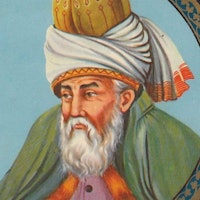Apprentice yourself … to a generous and righteous craftsman. Seek the pearl in the oyster shell … and seek craftsmanship from the skilled.
Apprentice yourself … to a generous and righteous craftsman. Seek the pearl in the oyster shell … and seek craftsmanship from the skilled.
Jalaluddin Mevlana Rumi

The Garment of Humility
Topic: Temperance & Humility
THE GARMENT OF HUMILITY
The meanest earning that goes on in the world,
is it ever practiced without the guidance of a master?
It begins with knowledge and is followed by action
that it may yield fruit after a while or after death.
Apprentice yourself, O possessor of intelligence,
to a generous and righteous craftsman.
Seek the pearl in the oyster-shell, my brother,
and seek craftsmanship from the skilled.
If you meet sincere spiritual counselors,
deal fairly with them and be eager to learn:
don’t put on any airs.
If a tanner wears a threadbare coat,
that doesn’t diminish the master’s mastery;
if the blacksmith with massive biceps
wears a patched apron while flexing the bellows,
his reputation doesn’t plummet in people’s eyes.
So strip the raiment of pride from your body:
in learning, put on the garment of humility.
Jalāl al-Dīn Muḥammad Rūmī (born September 30, 1207, in Balkh, present-day Afghanistan – died December 17, 1273, in Konya, present-day Turkey) is revered as one of the world’s greatest poets, mystics, and spiritual teachers. Known in the West simply as Rumi, he was born into a family of scholars and mystics who fled westward during the Mongol invasions, eventually settling in Konya, then part of the Seljuk Empire. Under the guidance of his father, Bahāʾ al-Dīn Walad, Rumi was trained in Islamic theology, jurisprudence, and the contemplative disciplines of the Sufi path. His early years reflected the classical model of a scholar-saint—rooted in devotion, study, and service to his community.
Rumi’s life was transformed by his meeting with the wandering mystic Shams of Tabriz around 1244. Their profound spiritual companionship awakened in Rumi a passion that transcended formal learning and opened him to the depths of divine love. When Shams mysteriously disappeared, Rumi’s grief became the flame that illuminated his poetry and devotion. From this crucible emerged the Mathnawī, often called the “Persian Qur’an,” a six-volume masterpiece that weaves stories, parables, and reflections into a vision of love as the animating force of all creation. His shorter lyric poems, collected in the Divan-e Shams-e Tabrizi, sing of longing, union, loss, and the ecstatic dance between the soul and the Beloved.
Rumi’s teachings centered on the transforming power of divine love, the unity underlying all faiths, and the inward journey from self-centeredness to God-centeredness. He taught that every experience—joy and sorrow, presence and absence—serves as a mirror reflecting the divine mystery. After his passing, his followers established the Mevlevi Order, known for its sacred whirling as a form of remembrance (dhikr). Across eight centuries, Rumi’s voice has transcended language, culture, and creed, inviting seekers into the stillness of the heart where the human and divine meet in love.
Mathnawi
Rumi, Jalal al-Din, et al. The Rumi Daybook. Shambhala, 2012, p. 297 [Mathnawi V:1054-1061].

Jalaluddin Mevlana Rumi
Resources
Copyright © 2017 – 2026 LuminaryQuotes.com About Us

Mathnawi V:1054-1061
Love Makes All the Difference: An Introduction to Rumi, by Jason Espada
It’s with good reason that great works are always in season. I was reminded again today of just how troubled this world is, how dis-empowered. Rumi’s works seem to be, once again, just exactly the right antidote: a true scale of values, food, and light for our times.
I’ve seen how it’s out of overflowing fullness and satisfaction and gratitude that the wish to give to others comes about. And so, here at last, are my favorite works by Rumi. Share the joy.
–Jason Espada [My Favorite Rumi, presented by Jason Espada, A Buddhist Library website – pdf].
My Favorite Rumi [Link is under Resources]
To say that many of us don’t see this world as it is, would be a huge understatement, I know, but we have to start somewhere. For a lot of people, human beings are little more than animals, and life is mostly about struggle – it’s something to be gotten through, with only brief moments of light or happiness. Or else, there’s a quality of ‘nothing special’ about it, with no feeling one way or another.
The tragedy of course is that our experience here doesn’t have to be this way. There are a few other people who tell us that, far from being a burden, this life is something to be celebrated. There are people who say this world is Divine – that it can be an unending source of wonder and joy. What do you think?
Most people usually don’t see it this way, and so they take advantage of each other, they prey on each other, or else they waste time, or feel bored, or dissatisfied. This is all so common.
In the greatest contrast to the way most people experience this world, there are those who have found a deep source of nourishment in this life, such that everything they say, and everything they do comes out of that joy. Such people throughout time have been called ‘mystics’.
The 13th century Persian teacher and poet, Jelaluddin Rumi was one such person who was able to offer the world an inspiring vision, and also the guidance and encouragement to live from this realization. He tells us:
And he says:
And:
And:
–Jason Espada [My Favorite Rumi, presented by Jason Espada, A Buddhist Library website – pdf].
The Life of Rumi
Jalal ad-Din ar-Rumi was born 1207, in what is now Afghanistan. As a child, Rumi’s family traveled and settled in Turkey. Rumi succeeded his father as a Muslim teacher. Then, when he was 37 years old, Rumi met a mystic named Shams-I-Tabriz, and the two formed a deep spiritual relationship. Rumi’s students, it’s told, were jealous, and Shams disappeared, apparently killed out of jealousy.
Rumi grieved for his loss, having seen the Divine in Shams, or we can say having seen Shams as God, and as a doorway, to further understanding the mysteries of this life. In his grief, Rumi created the Turning Dance (called ’Whirling’) that is still a part of the Sufi Tradition today. The turning represents the search for Truth, the Beloved, the Divine, or God.
The Sufis are the mystics of Islam. The Sufi Path is sometimes called ‘The Path of Love’, or ‘The Way of Passion’, as love is such a strong element in their search for Truth, in their way of life, and their teaching.
Although they have some elements in common with more Orthodox Muslim traditions, the Sufis are also unique in some ways. They are not only looking for an intellectual understanding of the Divine – they aim for personal experience, and for union with this deep Truth, or with God. Another feature that stands out is that the Sufi’s love, for God, for the Divine, or for this life is often expressed in earthy, sensual language, like a lover speaking or writing to his beloved. And so their writing moves from the experiences of longing, to the joy at being touched, to those of fulfillment.
Rumi says:
And:
And:
In the translations that have reached the West, there are included many teaching stories that are meant to guide people to living more deeply. In addition to being beautifully expressed, there is a whole way of life described in these writings. Rumi describes how we can grow and develop as individuals, how we can learn to see, and to live more authentic lives; how we can find fulfillment. He describes many of the processes and obstacles that are a part of life – often in a humorous way, but always with compassion and respect for his listeners.
–Jason Espada [My Favorite Rumi, presented by Jason Espada, A Buddhist Library website – pdf].
A few additional quotes from Rumi:
And
–Jason Espada [My Favorite Rumi, presented by Jason Espada, A Buddhist Library website – pdf].